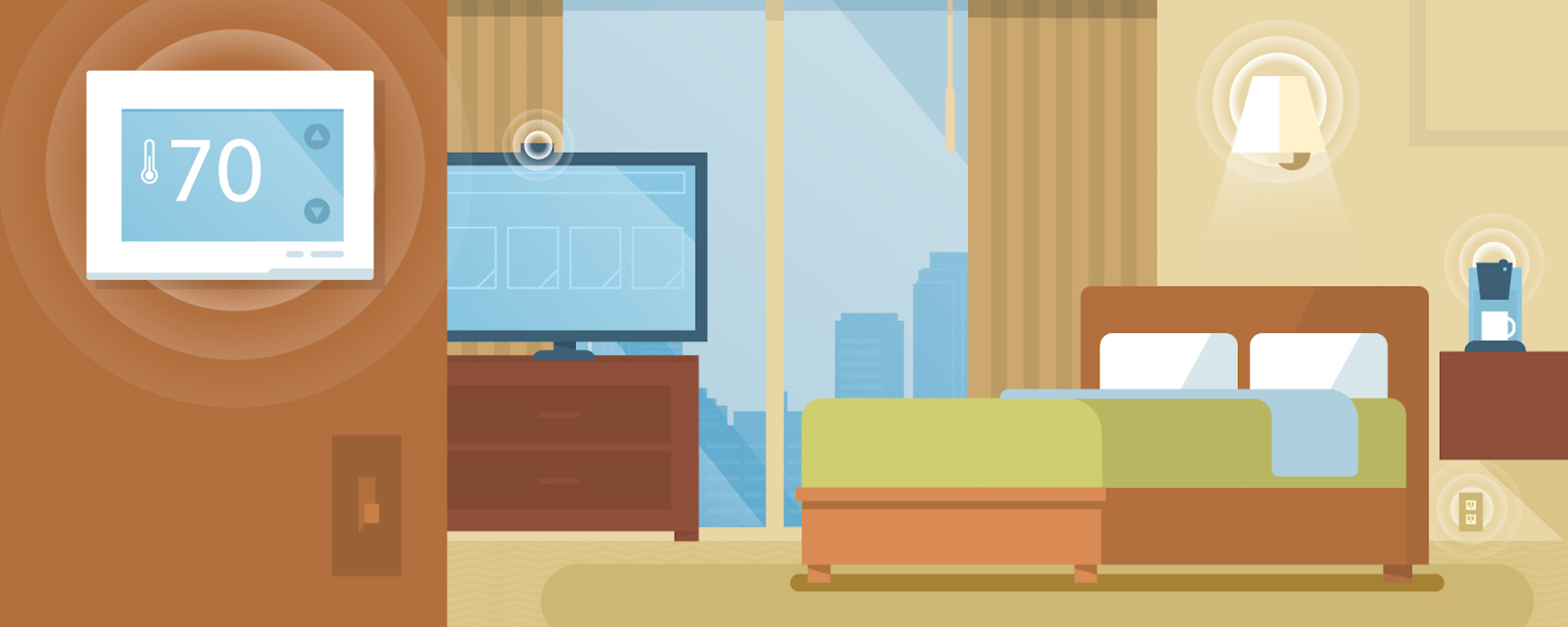Believe it or not, your hotel is most likely already a part of the Internet of Things (IoT). For example, if you’re using sensors in your guest rooms to adjust the thermostats when the rooms are vacant, then you’re already using IoT hospitality technology. On a basic level, IoT technology uses sensors to send and receive information that prompts an automated action, and using smart thermostats is just the beginning. Imagine a guest room in which the curtains close automatically when the shower begins running, or an elevator that is automatically called to a floor when a guest leaves his room.
The possibilities for IoT technology are almost endless, and the number of smart devices is only increasing. Gartner predicts that by 2020 there will be 26 billion Internet-connected devices. It’s essential for hotels to consider how they can integrate this powerful technology into their guest rooms, as well as their entire properties, to increase energy efficiency, address maintenance issues and improve guest satisfaction.
Using IoT Technology to Reduce Energy Consumption and Prevent Problems
With the focus in the hospitality industry on decreasing costs and being environmentally conscious, IoT technology is a natural fit. According to the Hotel Business Review, the hospitality industry should embrace IoT as a way to step up its energy efficiency efforts in three key areas. First, hotels should consider smart power sockets that report high electricity usage to the front desk to allow for further investigation into the cause. Second, sensors that measure the natural light in a guest room can dim lights when artificial light isn’t needed. Finally, sensors can automatically notify maintenance when an HVAC unit shows distress. The report also suggests using audio sensors that detect major, potentially costly malfunctions, such as leaky toilets and overflowing bathtubs.
Incorporating such IoT devices in your guest rooms can save money by identifying maintenance issues before they become costly problems. For example, an overflowing bathtub can cause serious damage to the floor and ceiling, as well as render the room completely uninhabitable until the problem is fixed. By addressing maintenance issues early, the issue can be addressed promptly by maintenance staff, and the room will be available for guests with little, if any, delay.
Increase Guest Satisfaction Through Personalized Service
You can also use IoT technology to deliver a personalized experience for your guests. By anticipating your guests’ needs, your hotel will see increased guest satisfaction rates. The Samsung LYNK Hospitality Management Solution (HMS), which is controlled via in-room smart TVs, provides a robust tool for automating guest rooms. The system combines intelligent room management, energy management, in-room controls and content management services in one user-friendly platform. This ensures that the hotel staff can optimize each room for energy efficiency, while also providing convenient entertainment options for guests.
A 2015 report by Hospitality Technology suggests many innovative uses for IoT in hotels to further improve the guest experience. The report suggests that tracking technology can be used on room service trays to notify the closest staff member when a tray is put in the hallway. For guests who prefer to awaken to the aroma of brewed coffee, the coffee maker can turn on automatically when motion sensors detect the guest is awake. The report also indicated that smart golf balls can be used to collect data so that hotel staff can congratulate the guest with a complimentary drink at the end of a great round. Each of these examples contributes to a positive guest experience.
By taking the time to investigate the IoT products that are currently available and determining innovative ways to use IoT technology in your hotel, you can both decrease your expenses and give your guests an experience they will remember.
Visit our hospitality solutions page to learn more about the technology that can help your hotel leverage the IoT.

